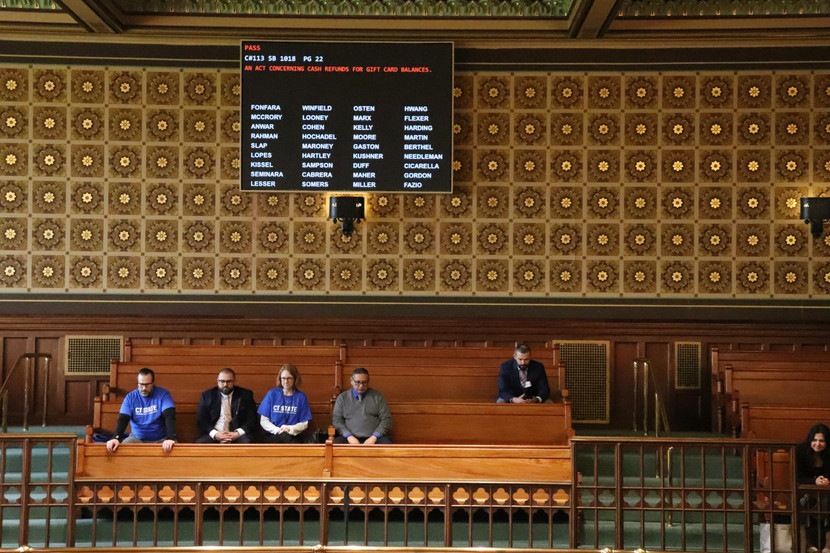Connecticut State Universities at Risk of Budget Cuts
- May 3, 2023
- 4 min read
Rebecca May Ristow | Managing Editor

Eastern Connecticut State University students and faculty at The Capitol Building
Recently, Connecticut State Colleges and Universities are on the brink of suffering a great financial loss. The state budget the Appropriations Committee endorsed for 2023-24 is what CT Insider calls, “$109 million short of the cost needed to maintain current services at Connecticut’s state colleges and universities”. The budget decreases even further in the 2024-25 fiscal year, falling an additional $116 million lower. Gov. Ned Lamont has proposed a budget that is even smaller and CSCU is at risk of huge cuts.
Many at Eastern Connecticut State University may have been nervous to see an email from the CSCU President’s office entitled, “Budget Update.” They announced that on April 24th, Terrence Cheng, CSCU President, along with institution leaders, Board of Regents members, “legislators, students, and other allies” were a part of a news conference. There, they announced the actions that they would be “forced to consider” if the state budget were to pass as proposed.
Cheng writes, “It would lead to program closures, shutting down high subsidy programs. Of course, our highest-cost programs that rely most on state support are those that meet the state’s greatest workforce needs.” The Board of Regents would essentially have to assess which campuses and institutions can sustain cuts and which cannot. She goes on to write that the proposed budget would dictate 650 layoffs to full-time faculty/staff, along with the removal of 3,000 part-time positions. Ben Barnes, CSCU’s chief financial officer, said the plan would eliminate roughly 4 out of every 10 part-time positions. These layoffs would then evolve into the diminishing of programs, services, and opportunities for students.
Other news sources lament that proposed cuts could also have dire effects on public safety, clerical work, administration, financial aid staff, athletics, and even ground maintenance. A proposed cut facing a lot of backlash is the diminishing of campus mental health resources. Outside of these cuts, the regents have approved a 3% increase in tuition and fees for the 2023-24 academic year. The additional plan, which is under review, would continue this increase up to 5% in 2024-25. According to CT Insider, state university students would be paying an average tuition of $13,405 per year, roughly $1,000 dollars higher than the current average.
The CSCU office proposed an “action day” at the Capitol in response to these changes. On Thursday, April 27th, students, faculty, staff, and administrators were called to protest in Hartford. People were encouraged to speak to legislators about the importance of accessible, public education and inform them of how the proposed budget would deeply harm the community. I went to this protest and here’s what I saw.

Various citizens line up outside of The Legislative Office
People from all around Connecticut met at the Legislative Office Building at 10:30am, while it was pouring rain, and despite the reason for being there, seemed to be enjoying themselves as they spoke with students and faculty from other institutions. People mingled in line, sharing their majors or positions in the school system. After most of the group got through security, we began to march to the Capitol, where we were met with even bigger crowds.
Attendees wore the apparel of their institutions and one of the catchphrases of the event was “Red for Ed” or Education. Faculty wore red colors, many being adorned with Connecticut State Colleges and Universities logos and two common phrases: “Our working conditions = students’ learning conditions” and “CSU works… because we do.”

CSCU faculty member wearing the "Red for Ed" shirt
According to the Economic Policy Institute, New York, Florida, and, unfortunately, Connecticut have the highest wealth gaps in America. In 2018, the top 1% earned over 35 times more than the bottom 99%. Connecticut, as of that report, was the state with the highest 1% income threshold. In this particular state, many believe it is crucial to protect access to things like higher education. Oftentimes, it is state universities and community colleges that are the most accessible. Not to mention, in an increasingly competitive job market, higher education is becoming more and more crucial for young people entering the workforce.
CSCU faculty members watching the Senate discuss upcoming bills
Eastern student Noel Teter, who attended the action day with the Office of University Relations, said that the impact he was most worried about were the layoffs. He commented on the extreme amount of effort it takes to work in higher education and what a disappointment it would be to see people let go. Additionally he talked about his experience as a music minor claiming, “the academic programs I’m in…tend to be kind of small,” and the seemingly small group of music minors and majors he’s with faced “issues with course cancellations going into this semester.” As many Eastern students may have seen, this was true of many programs. At the top of the Spring semester, the Fine Arts building was even adorned with posters urging students to contact Academic Affairs about the issue. Many students, especially seniors, were forced to take independent studies or courses that would substitute for the ones canceled.
Teter continued by saying, “I’m not sure how that may correlate with any budget cuts,” which he felt was unfortunate especially when noting the advanced facilities and faculty the Fine Arts building has. Another anonymous Fine Arts student commented that they didn't want anyone to have to worry about the “security of their program,” especially when many worry that the humanities and arts will be the first victims of the cuts. A lot of this fear comes from uncertainty and hopefully, as we learn more about the budget, institutions will begin to comment on their own responses and plans.
Crowds of students and faculty inside The Legislative Building
While Barnes believes that students should not be worried about institutions closing, inevitably, there will be changes. Citizens who are concerned about the proposed budget should get in contact with their legislators and encourage them to amend the budget before it is passed. You can find out how at https://www.cga.ct.gov/asp/menu/cgafindleg.asp.
















Comments